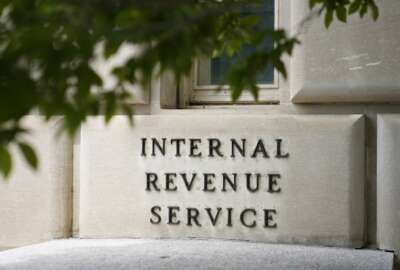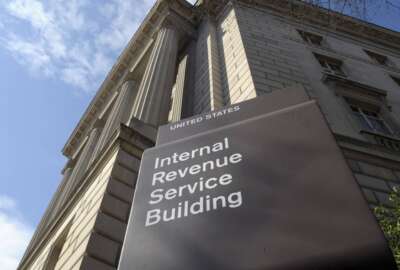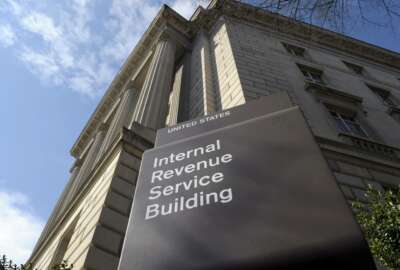IRS hiring 3,700 enforcement agents ‘doable,’ if it learns from past recruiting challenges
The IRS is staffing up its enforcement operations to ensure wealthy individuals and large corporations pay the taxes they owe the federal government.
The IRS is staffing up its enforcement operations to ensure wealthy individuals and large corporations pay the taxes they owe the federal government.
The IRS announced last Friday it plans to fast-track the hiring of more than 3,700 internal revenue agents across the country. Agents focus on complicated tax compliance issues, and are trained to audit large corporations and complex partnerships.
IRS Commissioner Danny Werfel said in a statement that the agency’s newest hires will help reverse a decade-long decline in audits for the wealthy and large corporations.
“This is another important step for the IRS as we work to transform the agency and make improvements,” Werfel said.
The agency said the job is a mid-career position that pays about $125,000 a year. Total compensation – when factoring federal employee benefits like child care, paid parental leave and student loan repayment – is closer to $175,000.
IRS Human Capital Officer Traci DiMartini said in a statement that the agency “provides a competitive financial package for people with expertise in this high-demand area.”
The announcement marks the IRS’s second major hiring initiative under the Inflation Reduction Act. The agency through the legislation has roughly $60 billion to rebuild its workforce and modernize its legacy IT over the next decade.
The IRS answered many more calls and taxpayer questions during this year’s filing season, after it focused on hiring more customer service employees.
The agency expects a similar hiring wave across its enforcement division will give it the capacity to go after wealthy tax cheats and large corporations paying less than what they owe.
Doreen Greenwald, national president of the National Treasury Employees Union, told reporters Monday that the IRS is setting realistic hiring targets, but said the agency will need to step up its training of new hires.
“I think it’s a doable goal by the IRS. That said, it’s going to rely on people who have a background in auditing and accounting,” Greenwald said. “Even if you have private-sector experience in auditing or being a CPA and preparing returns, it’s very different work, when you come to work for the IRS, as to how you audit. So the challenge of making sure you’re training people in that environment, especially with complex tax returns, that is a long process, and training is usually a team effort.”
A recent report from the Treasury Inspector General for Tax Administration shows the IRS struggled to meet its enforcement hiring goals earlier this year – even with more resources under the Inflation Reduction Act.
The IRS planned to hire 3,833 revenue agents in fiscal 2023, but by the end of March, it only hired 34.
Those hires were split between its large business and international division and its small business and self-employed operations.
TIGTA also found the IRS lost significantly more revenue agents than they hired in the first half of FY 2023.
The IRS is using its direct hire authority, granted by the Office of Personnel Management, to bring on new enforcement personnel more quickly.
Greenwald said that direct hire authority allows the IRS to cut the lengthy federal hiring process roughly in half — from about six months to 90 days.
“If another agency can speed up their onboarding faster than the IRS, they go to that agency,” she said.
However, a faster hiring process doesn’t mean candidates will clear all the hurdles to receive a job offer from the IRS.
The agency is also seeing a high rate of attrition among candidates who don’t clear a background investigation. The IRS, as part of that investigation, goes through a candidate’s tax returns to make sure they are caught up on their tax liabilities.
“The IRS, more than other agencies, has a lot of criteria that must be met, because it maintains a high integrity of its workforce,” Greenwald said about the background investigations. “It’s a long process, and I will tell you the private sector often is able to hire much faster, because they don’t have the processes that the federal government does.”
The IRS told TIGTA that the average investigation of high-wealth individuals takes two years to complete and often requires the IRS to commit substantial resources. Agency officials said high-income taxpayers often keep their wealth in “opaque sources,” including offshore bank accounts and complex business structures.
“For example, a new hire may have significant corporate experience from working in a private company tax department but have very limited individual tax experience,” TIGTA wrote.
Greenwald said many new IRS hires take between two and five years on the job to feel fully confident.
“It’s not something that you’re trained in a week and you can hit the floor running. It takes a long time to build a successful IRS employee, where they’re confident in the work that they’re doing. It’s complex in nature, so all of that adds to complexities in hiring and retaining employees,” she said.
The IRS is also working with OPM to take a closer look at exit interview data to boost retention and better understand why its employees leave the agency midway through their careers.
“Our main thing is making sure the hiring is done well, they have a good experience when they onboard, that they’re supported with training, that they have a manager in place that will assist them in their first year,” Greenwald said.
“Not having enough staff has been pushing people to have to do more with less earlier in their career than they should be asked to do. That causes people to leave,” Greenwald said.
“We want them on as career people, not just coming in for a brief time. We hope that they see there’s a career for them at the IRS going forward.”
The TIGTA report recommended the IRS offer more comprehensive training to revenue agents assigned to audit high-income earners. The report found that newly hired agents who didn’t go through an initial round of specialized training in 2020 were limited to watching videos of the previously held training and doing self-study.
Deputy IRS Commissioner Douglas O’Donnell told TIGTA that “effective employee training is fundamental to the agency’s ability to fairly enforce tax laws.”
“Our goal is not to provide a standard training program to all employees but rather to tailor each employee’s professional development program to both their existing knowledge, skills and professional experience as well as the specific work they will perform,” O’Donnell wrote. “The full scope and detail of these initiatives are still being developed as part of the implementation process and the impact of these implementation activities will take time to fully realize.”
Copyright © 2025 Federal News Network. All rights reserved. This website is not intended for users located within the European Economic Area.
Jory Heckman is a reporter at Federal News Network covering U.S. Postal Service, IRS, big data and technology issues.
Follow @jheckmanWFED






